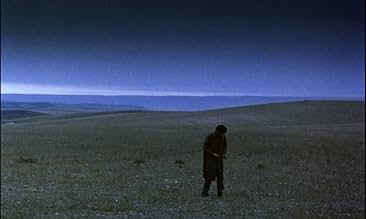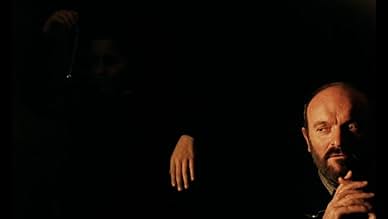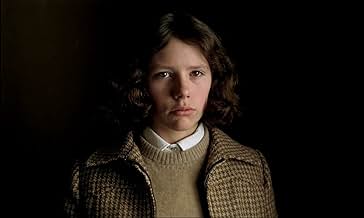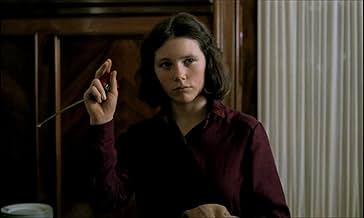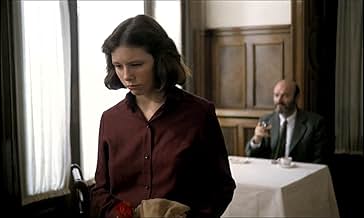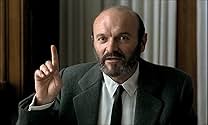VALUTAZIONE IMDb
7,8/10
6951
LA TUA VALUTAZIONE
Una donna riflette sulla sua relazione d'infanzia con suo padre, cercando di capire la profondità della sua disperazione e la verità dei suoi miti.Una donna riflette sulla sua relazione d'infanzia con suo padre, cercando di capire la profondità della sua disperazione e la verità dei suoi miti.Una donna riflette sulla sua relazione d'infanzia con suo padre, cercando di capire la profondità della sua disperazione e la verità dei suoi miti.
- Regia
- Sceneggiatura
- Star
- Premi
- 7 vittorie e 2 candidature totali
Aurore Clément
- Irene Ríos
- (as Aurora Clement)
- …
José Luis Fernández 'Pirri'
- Carioco
- (voce)
- (non citato nei titoli originali)
José García García Morilla
- Chófer
- (non citato nei titoli originali)
Chus Lampreave
- Casilda
- (non citato nei titoli originali)
Jesús Nieto
- Agustín Arenas- voz
- (non citato nei titoli originali)
Recensioni in evidenza
I feel compelled to relate this as it has been at least ten years since I saw this film (in a student union theater) and it still has a powerful hold on my memory. I have been unable to find it on video, so my recollections are fragmentary.
I was so impressed, involved, and moved by this tale that I left the cinema feeling as if I were floating just above the pavement. One is quietly and adroitly drawn in by the mystery that the young daughter in 1950s Spain senses in her father. The political dimension is brilliantly nuanced, carefully alluded to without speechifying. The wondrous cinematography captures light so deftly at times that it is almost luminous: late afternoon sunlight across a room, snow slowly falling (viewed through a window), a rain soaked street at night. As the daughter grows to adolescence the enigma of her reticent father begins to clear. It may not sound like much in my words, but from wool Victor Erice has spun gold.
I was so impressed, involved, and moved by this tale that I left the cinema feeling as if I were floating just above the pavement. One is quietly and adroitly drawn in by the mystery that the young daughter in 1950s Spain senses in her father. The political dimension is brilliantly nuanced, carefully alluded to without speechifying. The wondrous cinematography captures light so deftly at times that it is almost luminous: late afternoon sunlight across a room, snow slowly falling (viewed through a window), a rain soaked street at night. As the daughter grows to adolescence the enigma of her reticent father begins to clear. It may not sound like much in my words, but from wool Victor Erice has spun gold.
There's no doubt that Erice is one of the best Spanish directors ever, and each film he's made is an absolute masterpiece. I shall not comment anything about the plot, the acting, not even about cinematography. I'm writing this post in order to give IMDb's users a little information which, I think, may solve some questions about this film (why its plot is so "episodic"? why the DVD copy seems a low-quality one? etc): well, actually "El Sur" is an unfinished work! The production was stopped due to money trouble, and Erice wasn't able to complete his film with Estrella's travel to the mythical South named in the title. Many years later, Erice himself explained this film's odyssey in a recorded interview for the Spanish TV.
A beautiful movie, even if I am not a Spaniard, and the historical perspective doesn't ring too much of a bell.
I would look at the movie as a relationship between a father and a daughter, and there for any father of a daughter (if both are sensitive and a bit introvert / taciturn), it would ring bells.
Father (only mentioned) and Son are on the opposite sides (of civil war, but that is not important), and the antagonism of their espoused cause permeates into their personal relation ship, and the son is thrown out/ moves out.
Wandering around for some time, he finally settles down at a remote place, opposite to his father's (north vs South, Freezing temperature Vs hot weather), with his wife and small daughter. He is the doctor in that small town, and people (and daughter), believe he has mystic powers (he might have).
There are mysteries in his life, some of which his wife knows (probably she knows most), but naturally not the young daughter (she was 8), which makes him more mysterious and interesting for her.
By accident she comes to know that there was another woman in his life (definitely before marriage), whom he had forsaken, but not forgotten. When she is again reminded (she is a starlet, and her one of the movies had been screened on the town), the longing and the memories awake. He is now in a dilemma, one side is his old flame (Irene), on the other, wife and daughter. He hovers on the edge, to abandon which side and jump on to which.
Had the movie been completed, probably I would have known some missing links - the actual story between Laura (screen pseudonym Irene Rios) and Agustin. But even without that it doesn't compromise the plot. It is just that he had been in love, got jealous (probably there was some one else too), and then got married and left the girl and the place. She could be instrumental in that as much as his father was, but that is my guess. In the movie, despite all misunderstandings, the flame burned in him, and another one was of the wife and daughter. Which one to extinguish ? It has a strong angle on the father - daughter relationship and the lack of communication in case of both being introvert - and the ill effects of such relation, especially in crisis. It has a close relationship with many - including the author of Mary Poppins (and her relation with her father). In fact, one could almost say it is P L Travers's biography. At least as much we know of it (except only probably the other woman angle).
Had the movie been completed, probably I would have known some missing links - the actual story between Laura (screen pseudonym Irene Rios) and Agustin. But even without that it doesn't compromise the plot. It is just that he had been in love, got jealous (probably there was some one else too), and then got married and left the girl and the place. She could be instrumental in that as much as his father was, but that is my guess. In the movie, despite all misunderstandings, the flame burned in him, and another one was of the wife and daughter. Which one to extinguish ? It has a strong angle on the father - daughter relationship and the lack of communication in case of both being introvert - and the ill effects of such relation, especially in crisis. It has a close relationship with many - including the author of Mary Poppins (and her relation with her father). In fact, one could almost say it is P L Travers's biography. At least as much we know of it (except only probably the other woman angle).
10jsorribe
After "The Spirit of the Beehive" Erice retakes post-civil war Spain through the eyes of a child (and later a teenager in this case). Not only the director recreates admirably the atmosphere of those gloomy years in my country, but also succeeds in showing the relationship between a bitter, low-spirited father and his vital daughter. Wonderful cinematography and sets also contribute to create a masterwork in which every camera move, every dialogue line and every fade constitute a brilliant piece of its own. An absolute must for all cinema lovers.
Victor Erice's little masterpiece earned itself a permanent place in the repertoire of Spanish film-making. Not surprisingly: Franco was dead and Spain had bravely struggled out of a difficult transition to form a now much-respected democratic and modern nation. If art - whether literature or cinema - is to reflect that important step in a country's advance, perhaps "El Sur" (The South) is one of the four or five Spanish films of the last twenty five years which best marked that change.
Beautifully filmed in natural lighting, even in the interior of an old rural house (Ezcaray, La Rioja), the deep feelings transmitted between daughter and father reveal a delicacy so often missing in more banal entertainment. Young Sonsoles Aranguren and Icíar Bollaín play delicious roles which swing rather uncertainly from late adolescence to young womanhood as the daughter who attempts to fathom out her father (and in so doing, herself) with an extraordinarily powerful performance which obliges the intelligent viewer into the film. And Omero Antonutti plays the exact counterpart, carefully balancing his role such that he never overshadows his "daughter's" interpretation. The scenes and dialogues are enchanting, never over-acted or otherwise exaggerated; at all moments Erice maintains full control over the film's development, giving just enough touch of exquisiteness and sensitivity, allowing the film to move unhurriedly through simple but moving scenes to the predictable outcome.
Here indeed is moving theatre-cinema: the understanding spectator will leave with a certain mixture of feelings if he knows a little of Spain and its people; he will not leave unmoved, cold.
Beautifully filmed in natural lighting, even in the interior of an old rural house (Ezcaray, La Rioja), the deep feelings transmitted between daughter and father reveal a delicacy so often missing in more banal entertainment. Young Sonsoles Aranguren and Icíar Bollaín play delicious roles which swing rather uncertainly from late adolescence to young womanhood as the daughter who attempts to fathom out her father (and in so doing, herself) with an extraordinarily powerful performance which obliges the intelligent viewer into the film. And Omero Antonutti plays the exact counterpart, carefully balancing his role such that he never overshadows his "daughter's" interpretation. The scenes and dialogues are enchanting, never over-acted or otherwise exaggerated; at all moments Erice maintains full control over the film's development, giving just enough touch of exquisiteness and sensitivity, allowing the film to move unhurriedly through simple but moving scenes to the predictable outcome.
Here indeed is moving theatre-cinema: the understanding spectator will leave with a certain mixture of feelings if he knows a little of Spain and its people; he will not leave unmoved, cold.
Lo sapevi?
- QuizDirector Víctor Erice considers this to be an unfinished project. The original script consisted of more than 400 pages and was scheduled to be shot in 81 days. 48 days into shooting, when production was to be moved to the south of Spain, producer Elías Querejeta unexpectedly suspended the project, allegedly because of financing objections by Televisión Española, the backing television network. However, Querejeta revealed years later that he made the decision because he thought the film was complete with what they'd shot so far.
- ConnessioniFeatured in Huellas de un espíritu (1998)
- Colonne sonoreLa puerta del Sagrario
Composed by Enrique Granados
I più visti
Accedi per valutare e creare un elenco di titoli salvati per ottenere consigli personalizzati
- How long is El Sur?Powered by Alexa
Dettagli
- Data di uscita
- Paesi di origine
- Sito ufficiale
- Lingua
- Celebre anche come
- El Sur
- Luoghi delle riprese
- Aziende produttrici
- Vedi altri crediti dell’azienda su IMDbPro
Botteghino
- Lordo in tutto il mondo
- 22.720 USD
Contribuisci a questa pagina
Suggerisci una modifica o aggiungi i contenuti mancanti

